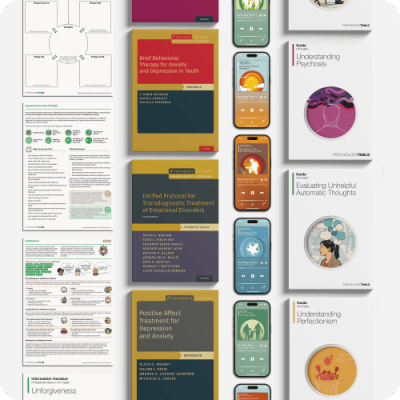As a family physician, clinical educator, and program director, I use Psychology Tools every day – with patients, trainees, and for my own reflection. The evidence-based worksheets, handouts, and audio exercises are clear, rigorous, and easy to access, helping patients practice between appointments. For teaching, it creates a shared language that bridges theory and practice. It saves me time and strengthens compassionate, informed care.
Dr. Marina Malak
MD, CCFP, BSc.N Physician, Educator and Program Director
Psychology Tools has supported my journey from student to clinician with clear, evidence-based resources that enhance learning, streamline treatment planning, and strengthen client engagement. The materials save time, improve confidence, and consistently support better therapeutic outcomes. Highly recommended for students and practitioners.
Ash Hendry
Clinical Psychology Registrar
I cannot speak highly enough of Psychology Tools and the invaluable resources it provides. It has transformed the way I deliver therapy—saving time, improving care quality, and enhancing client engagement. The screen-sharing and homework features also increase accountability and support better outcomes.
Nitasha Ahuja
Clinical Social Worker
I used to spend far too long searching for resources that weren’t quite right. Now, logging into Psychology Tools is simple and reliable. I can confidently share well-researched, professionally presented materials, and the ever-growing library means there’s always something helpful to use with clients.
Dr Megan Kendall
Clinical Psychologist
I have used Psychology Tools for almost 5 years in my clinical practice. The website offers an invaluable resource for anyone interested in mental health. Its user-friendly interface, high-quality content, and commitment to evidence-based practice make it a valuable asset for therapists, students, and individuals seeking to enhance their understanding of psychology and improve their well-being.
Paul Kirsten
Consultant Psychological Therapist
Psychology Tools is an invaluable, game-changing resource in my clinical practice. Its extensive database saves me from creating worksheets, handouts, and audio recordings, freeing precious time and reliably supporting me to focus on priorities and continually refine my clinical skills.
Dr Nathan Lay
General Practitioner
Our team chose Psychology Tools for its time-saving, high-quality, professionally designed resources. The editable, multilingual materials improve client engagement, support staff at all levels, and offer flexible depth - from quick overviews to detailed guides - allowing us to tailor learning and enhance therapy sessions.
Nancie Prud'homme
Principal Clinical Psychologist & Team Lead
My team has used Psychology Tools for a year and love the evidence-based resources. Emailing materials to clients is brilliant, and staff support is always responsive.
Dr Imogen Reid
Consultant Clinical Psychologist
As a supervising clinician, Psychology Tools has become essential to our day-to-day practice. Its evidence-based, session-ready materials reduce prep time, build supervisee confidence, and support measurable client progress. The clear design and multilingual options improve engagement, accessibility, and therapy outcomes across CBT, DBT, ACT, and schema approaches.
Jenn Richie
Supervising Clinician
Psychology Tools is becoming an essential part of my practice. User-friendly filters and categories help me find exactly what I need quickly, while clients describe the worksheets and psychoeducation as clear, engaging, and a focus for rich therapeutic discussion.















